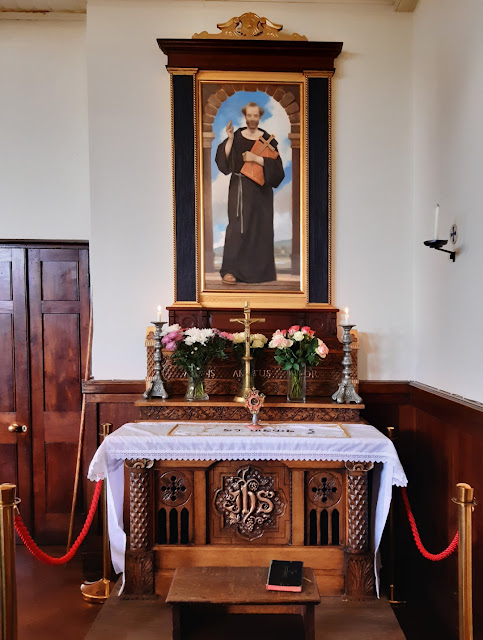Assent and papal magisterium
Various questions have arisen recently concerning the assent that we ought to give to the words of the Holy Father. I thought it might be helpful to give a few notes concerning the papal magisterium from classical Catholic theology. I have referred to the excellent Jesuit manual Sacrae Theologiae Summa published by BAC.
When the Pope defines ex cathedra a doctrine concerning faith or morals, he enjoys that infallibility with which Our Lord willed the Church to be endowed. To these definitions, we must give the assent of faith. Obvious examples are the definition of the Immaculate Conception by Blessed Pius IX in 1854 and the definition of the Assumption by Pope Pius XII in 1950.
The Pope also teaches with an authentic magisterium (teaching authority) that is not infallible. Examples of such teaching are the encyclical letters of the Pope, and decrees issued by the Holy See in forma specifica.
Decrees of the Holy See may be issued merely in forma communi. This approval means that they are legitimate, authentic and to be promulgated. But this approval does not make such statements to be formal decrees of the Supreme Pontiff. To such statements or decrees, we must give obedience, though we may internally disagree with them.
Decrees of the Holy See that are issued in forma specifica are those that are expressly published as the Supreme Pontiff’s own decrees. They are inferior to ex cathedra statements but, as part of the authentic magisterium of the Supreme Pontiff, they do not require the assent of faith but they do demand our religious submission of mind and will. Lumen Gentium n.25 affirms this.
Popes may also teach privately. Such teaching would be expressed, for example, in sermons, interviews or books. When Pope Benedict published his book Jesus of Nazareth, he said:
Hence, if you are troubled by some statements that Pope Francis has made in his recent interviews, it is not disloyalty, or a lack of Romanita to disagree with the details of some of the interviews which were given off-the-cuff.
Naturally, if we disagree with the Holy Father, we do so with the deepest respect and humility, conscious that we may need to be corrected. However, papal interviews do not require either the assent of faith that is given to ex cathedra statements or that internal submission of mind and will that is given to those statements that are part of his non-infallible but authentic magisterium.
In the case of Blessed John Paul II and Pope Benedict, there were liberal commentators who rubbished the authentic magisterium, contradicted the traditional teaching of the Church, and generally treated those Popes with disrespect. We must never do this to the successor of St Peter. In giving a reasonable opinion which may disagree with an informal and off-the-cuff remark, we must always retain that Catholic spirit which respects the person and the office of the Supreme Pontiff, the successor of St Peter. We are neither ultramontanes nor gallicans but loyal Catholics in the tradition of St John Fisher, St Thomas More, St Catherine of Siena, St Vincent of Ferrer and others who from time to time respectfully took issue with some of the statements or actions of the Vicar of Christ.
When the Pope defines ex cathedra a doctrine concerning faith or morals, he enjoys that infallibility with which Our Lord willed the Church to be endowed. To these definitions, we must give the assent of faith. Obvious examples are the definition of the Immaculate Conception by Blessed Pius IX in 1854 and the definition of the Assumption by Pope Pius XII in 1950.
The Pope also teaches with an authentic magisterium (teaching authority) that is not infallible. Examples of such teaching are the encyclical letters of the Pope, and decrees issued by the Holy See in forma specifica.
Decrees of the Holy See may be issued merely in forma communi. This approval means that they are legitimate, authentic and to be promulgated. But this approval does not make such statements to be formal decrees of the Supreme Pontiff. To such statements or decrees, we must give obedience, though we may internally disagree with them.
Decrees of the Holy See that are issued in forma specifica are those that are expressly published as the Supreme Pontiff’s own decrees. They are inferior to ex cathedra statements but, as part of the authentic magisterium of the Supreme Pontiff, they do not require the assent of faith but they do demand our religious submission of mind and will. Lumen Gentium n.25 affirms this.
Popes may also teach privately. Such teaching would be expressed, for example, in sermons, interviews or books. When Pope Benedict published his book Jesus of Nazareth, he said:
It goes without saying that this book is in no way an exercise of the magisterium, but is solely an expression of my personal search "for the face of the Lord" (cf. Ps 27:8). Everyone is free, then, to contradict me. I would only ask my readers for that initial goodwill without which there can be no understanding.I mentioned this in a post three years ago and, I think reasonably, said that the same would apply to papal interviews with journalists.
Hence, if you are troubled by some statements that Pope Francis has made in his recent interviews, it is not disloyalty, or a lack of Romanita to disagree with the details of some of the interviews which were given off-the-cuff.
Naturally, if we disagree with the Holy Father, we do so with the deepest respect and humility, conscious that we may need to be corrected. However, papal interviews do not require either the assent of faith that is given to ex cathedra statements or that internal submission of mind and will that is given to those statements that are part of his non-infallible but authentic magisterium.
In the case of Blessed John Paul II and Pope Benedict, there were liberal commentators who rubbished the authentic magisterium, contradicted the traditional teaching of the Church, and generally treated those Popes with disrespect. We must never do this to the successor of St Peter. In giving a reasonable opinion which may disagree with an informal and off-the-cuff remark, we must always retain that Catholic spirit which respects the person and the office of the Supreme Pontiff, the successor of St Peter. We are neither ultramontanes nor gallicans but loyal Catholics in the tradition of St John Fisher, St Thomas More, St Catherine of Siena, St Vincent of Ferrer and others who from time to time respectfully took issue with some of the statements or actions of the Vicar of Christ.



